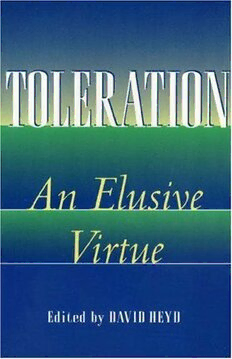
Toleration: An Elusive Virtue PDF
253 Pages·1996·0.784 MB·English
Most books are stored in the elastic cloud where traffic is expensive. For this reason, we have a limit on daily download.
Preview Toleration: An Elusive Virtue
Description:
If we are to understand the concept of toleration in terms of everyday life, we must address a key philosophical and political tension: the call for restraint when encountering apparently wrong beliefs and actions versus the good reasons for interfering with the lives of the subjects of these beliefs and actions. This collection contains original contributions to the ongoing debate on the nature of toleration, including its definition, historical development, justification, and limits. In exploring the issues surrounding toleration, the essays address a variety of provocative questions. Throughout, the contributors point to the inherent indeterminacy of the concept and to the difficulty in locating it between intolerant absolutism and skeptical pluralism. Religion, sex, speech, and education are major areas requiring toleration in liberal societies. By applying theoretical analysis, these essays show the differences in the argument for toleration and its scope in each of these realms. The contributors include Joshua Cohen, George Fletcher, Gordon Graham, Alon Harel, Moshe Halbertal, Barbara Herman, John Horton, Will Kymlicka, Avishai Margalit, David Richards, Thomas Scanlon, and Bernard Williams. "When subtle thinkers probe tolerance with the acuity of this volume's contributors, we see both how far the notion stretches, and the profound challenges it poses to our habits of thinking." --The Philadelphia Inquirer
See more
The list of books you might like
Most books are stored in the elastic cloud where traffic is expensive. For this reason, we have a limit on daily download.
